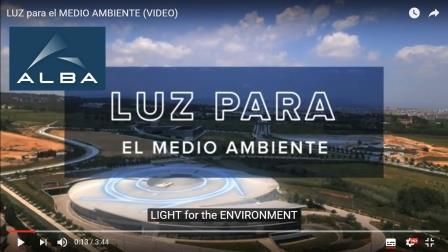
11/01/2017
ALBA Synchrotron Is Also a Tool for the Environment
ALBA Synchrotron Is Also a Tool for the Environment
Environment, health, food, cultural heritage ... ALBA synchrotron's users coming from universities and research centres explain in short videos how they have taken advantage of the synchrotron light and how it can benefit for their research.
The fourth of these videos posted on line just before Christmas is focused on environmental issues. Jordi Llorca, professor at the Universitat Politècnica de Catalunya (UPC), explains how the study, design and production of new catalysts can have a positive impact on environment. In that case, Jordi Llorca and his team have used the ALBA synchrotron CIRCE beamline, a variable polarization soft X-ray beamline dedicated to advanced photoemission experiments.
Thanks to CIRCE, these researchers have successfully analyzed the surfaces and the mechanisms of action of catalyst nanoparticles in conditions very close to actual conditions of use. These results allow the design of new catalysts, especially in two domains of special interest for Jordi Llorca’s team: catalysts to produce hydrogen and catalysts to oxidize the carbon soot emitted by diesel engines.
Please follow the ALBA’s Youtube channel to watch the complete series of these outreach videos. They are filmed in Spanish and Catalan, although subtitles are available in English, Catalan and Spanish using the Settings button and in many more languages with the Auto-translate option.
The fourth of these videos posted on line just before Christmas is focused on environmental issues. Jordi Llorca, professor at the Universitat Politècnica de Catalunya (UPC), explains how the study, design and production of new catalysts can have a positive impact on environment. In that case, Jordi Llorca and his team have used the ALBA synchrotron CIRCE beamline, a variable polarization soft X-ray beamline dedicated to advanced photoemission experiments.
Thanks to CIRCE, these researchers have successfully analyzed the surfaces and the mechanisms of action of catalyst nanoparticles in conditions very close to actual conditions of use. These results allow the design of new catalysts, especially in two domains of special interest for Jordi Llorca’s team: catalysts to produce hydrogen and catalysts to oxidize the carbon soot emitted by diesel engines.
Please follow the ALBA’s Youtube channel to watch the complete series of these outreach videos. They are filmed in Spanish and Catalan, although subtitles are available in English, Catalan and Spanish using the Settings button and in many more languages with the Auto-translate option.
More news
29/09/2016
Barcelona, a Friendly Ecosystem for Start-Ups
22/09/2016
Barcelona, capital of particle accelerators science and technology
15/09/2016
Tech Companies With More Than $1 Million Raised: Barcelona Ranks 5th In Europe
09/09/2016
UB and UAB Universities Stand out in Spain According to Main International Rankings
31/08/2016
New CaixaBank's Data Center Implementation Completed In Barcelona Synchrotron Park
25/08/2016
Barcelona, 4th most creative city in the world









